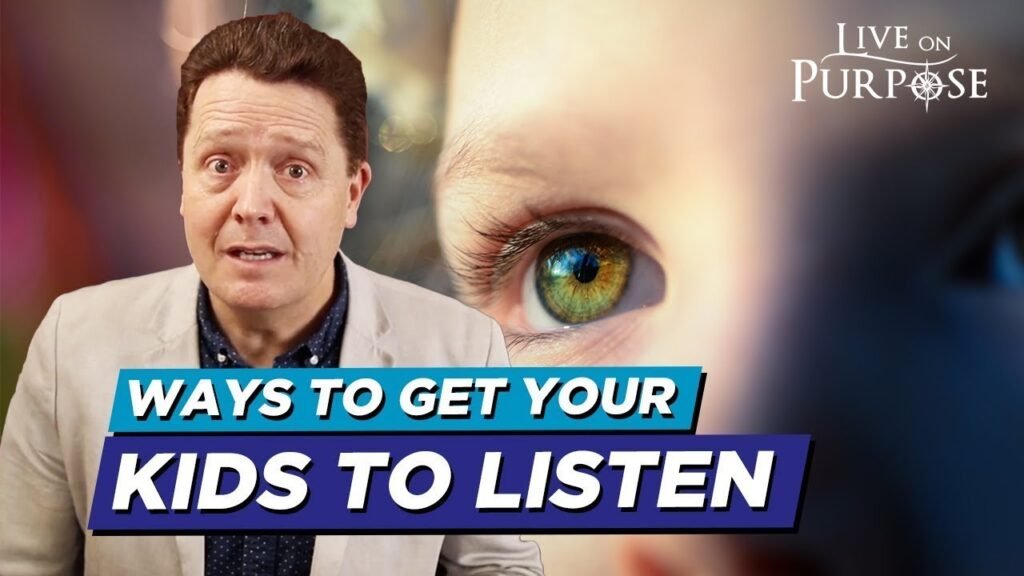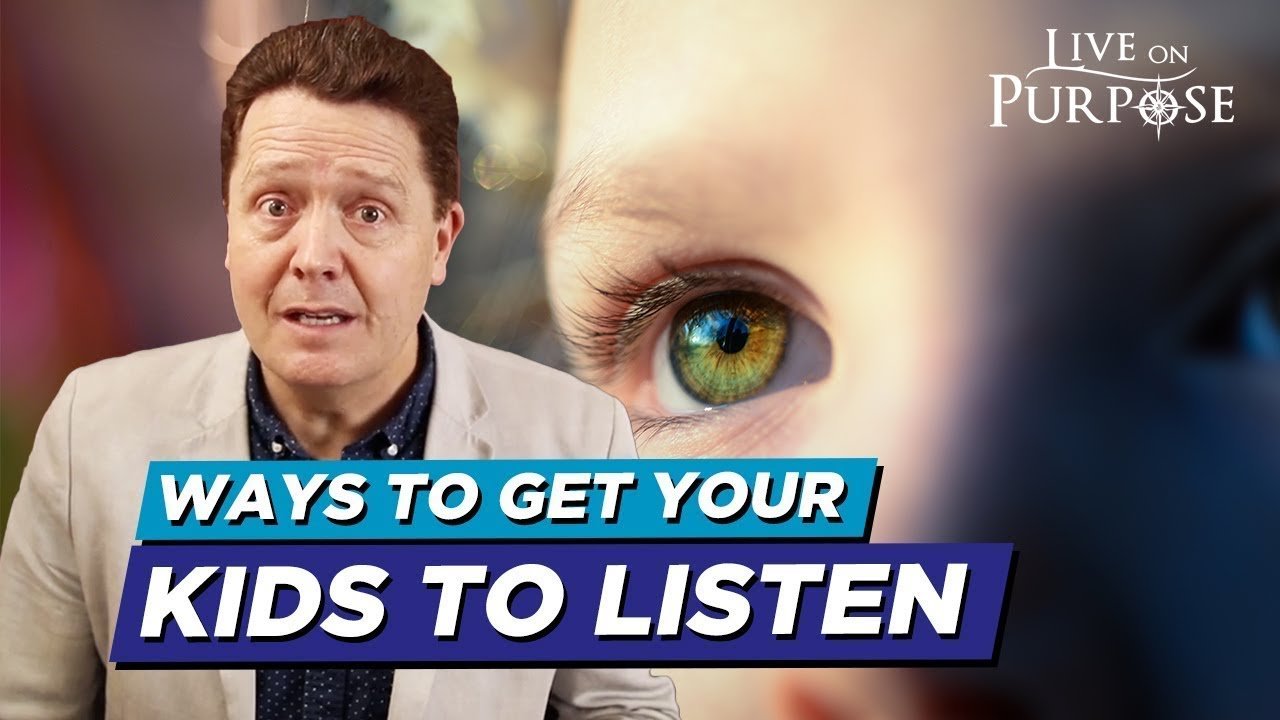In the video titled “How Different Strategies Work for Each Stage of Moral Development,” the speaker provides valuable tips on how to get your kids to listen the first time. The video emphasizes the importance of understanding why kids should listen from their perspective and introduces the concept of the three stages of moral development. The speaker advises parents to get on their child’s level physically and mentally, as well as to let go of the need for children to listen and instead focus on using effective consequences. Repetition is also highlighted as a crucial tool for children to learn. Overall, this video aims to equip parents with effective strategies to improve communication and cooperation with their children.
In the video by Live On Purpose TV, Dr. Paul Jenkins shares game changer tips on how to get your kids to listen the first time. By understanding why kids should listen from their perspective, parents can adjust their approach accordingly. The video introduces the three stages of moral development and provides strategies that work best for each stage. Getting on your child’s level physically and mentally, letting go of the need for children to listen, and using effective consequences are among the recommendations. The importance of repetition in helping children learn is also emphasized.
How to Get Your Kids to Listen the First Time
Hey there, parents! Are you tired of constantly having to repeat yourself to your kids? Do you wish they would just listen to you the first time? Well, you’re in luck! In this article, we’re going to give you some game changer tips on how to handle this situation better.

Understanding Stage 1 of Moral Development
Before we dive into the strategies, it’s important to understand the different stages of moral development. At stage 1, children are very self-centered and only think about the consequences of their actions. They’re not yet capable of moral reasoning or considering what’s right or wrong. Keep this in mind as we explore the strategies for each stage.
Strategies for Stage 1
Since stage 1 kids are primarily motivated by consequences, it’s crucial to use effective consequences to get them to listen. You want to meet them on their level, both physically and mentally. Physically getting down to their level shows that you respect and understand them. Use clear and simple language that they can comprehend based on their development. This will help them connect with what you’re saying and increase their likelihood of listening the first time.
Understanding Stage 2 of Moral Development
At stage 2, children are willing to communicate rationally. They are starting to think beyond just the consequences of their actions. This is an important stage to consider when trying to get your kids to listen.
Strategies for Stage 2
For stage 2 kids, it’s essential to approach them differently than stage 1. They are more capable of understanding reasoning and logic, so engage them in conversations about why listening is important. Help them see the bigger picture and the impact of their actions on others. By appealing to their ability to communicate rationally, you can increase their motivation to listen to you.
Understanding Stage 3 of Moral Development
Stage 3 is characterized by higher-level thinking and independent decision-making. At this stage, children have internalized moral values and can think critically. They are more self-directed and don’t need as much external motivation to listen.
Strategies for Stage 3
For stage 3 kids, you can take a step back and let them exercise their autonomy. Empower them to make their own decisions and trust their judgment. Encourage open and honest discussions about moral dilemmas and guide them in their decision-making process. This approach fosters independence and self-reliance, which can lead to better listening skills.
Getting on the Child’s Level
To effectively communicate with your child, it’s crucial to get on their level both physically and mentally. Physically, this means meeting them at their eye level, whether it’s by sitting on the floor or crouching down. This simple act shows them that you value their perspective and are more likely to grab their attention.
Physical Level
By getting on their level physically, you create a sense of connection and understanding. It shows them that you are approachable and open to hearing their thoughts and concerns. This physical proximity helps build trust and strengthens your relationship with your child.
Mental Level
Getting on your child’s mental level means understanding their stage of development and using language and concepts that they can grasp. Pay attention to their cognitive abilities and use age-appropriate language to explain why listening is important. This will help them relate to what you’re saying and increase their motivation to listen.
Letting Go of the Need for Children to Listen
An important aspect of getting your kids to listen is letting go of your need for them to do so. When you’re overly focused on whether or not they’re listening, it can create tension and resistance between you and your child. Shifting the responsibility from yourself to them can be a game changer.
Understanding Children’s Autonomy
Children, like adults, have a natural desire for autonomy and independence. When you let go of the need for them to listen to you, you give them the space to make their own decisions and learn from their experiences. This empowers them to take responsibility for their actions and increases their motivation to listen.
Empowering Children’s Decision-Making
Instead of constantly telling your child what to do, give them opportunities to make their own choices. Encourage them to think critically and weigh the pros and cons of their decisions. By involving them in the decision-making process, you foster their autonomy and give them a sense of ownership over their choices.
Using Effective Consequences
Effective consequences can be a powerful tool in getting your kids to listen the first time. By linking consequences to their actions, you teach them the importance of listening and following instructions. There are two types of consequences you can use: natural consequences and logical consequences.
Natural Consequences
Natural consequences occur naturally as a result of a child’s actions. For example, if they don’t wear a coat on a cold day, they will feel cold. Allowing natural consequences to happen can help them learn from their mistakes and make better choices in the future. However, it’s essential to consider safety and intervene if necessary.
Logical Consequences
Logical consequences are consequences that are logically related to the child’s actions but are enforced by the parent. For example, if a child refuses to pick up their toys, a logical consequence could be not allowing them to play with their toys for a certain period. This helps them understand the link between their behavior and the consequences that follow.
The Importance of Repetition
Repetition is a key element in helping children learn and internalize moral values. By consistently reinforcing moral values, you create habits that become ingrained in their behavior. Repetition is especially crucial for kids in stage 1 who are still developing their understanding of right and wrong.
Reinforcing Moral Values
Reinforcing moral values can be done through various methods such as discussing moral dilemmas, reading books with moral lessons, and leading by example. Consistently emphasizing and discussing moral values helps children understand their importance and guides them in making ethical choices.
Creating Habits
Repetition is also essential for creating habits. By consistently practicing certain behaviors, they become second nature to your child. Encourage them to practice good listening skills by asking them to repeat back what you’ve said or praising them when they actively listen. Over time, these habits become ingrained in their behavior, making it more likely for them to listen the first time.
Incorporating Age-Appropriate Activities
Different stages of moral development require different activities to reinforce moral values and encourage listening skills. Tailoring activities to their stage of development helps engage children and make the lessons more relatable and meaningful to them.
Stage 1 Activities
For stage 1 kids, activities that focus on consequences can be effective. For example, setting up a reward system or creating a simple chart where they can track their own behavior and see the consequences can help them understand the importance of listening.
Stage 2 Activities
Stage 2 kids benefit from activities that encourage reasoning and critical thinking. Engage them in discussions about ethical dilemmas or play games that involve making choices and considering the consequences. This helps them develop their moral reasoning skills and increases their motivation to listen.
Stage 3 Activities
Stage 3 kids thrive in activities that promote independent decision-making and perspective-taking. Encourage them to participate in community service projects or engage in debates and discussions about social issues. This allows them to apply their moral values to real-world situations and further develop their ethical thinking.
Encouraging Empathy and Perspective-Taking
Empathy and perspective-taking are crucial in helping children understand the impact of their actions on others. By fostering empathy, you promote a sense of compassion and consideration for others, which can lead to better listening skills.
Developing Empathy
Empathy can be nurtured through various activities such as reading books or watching movies that portray diverse perspectives. Engage in open conversations about emotions and encourage your child to put themselves in someone else’s shoes. By understanding and relating to others’ feelings, they become more motivated to listen and respond empathetically.
Practicing Perspective-Taking
Perspective-taking exercises can help children develop a broader understanding of different viewpoints. Encourage them to consider how others may feel or think in different situations. This helps them develop empathy and increases their ability to understand and respect others’ perspectives.
Summarizing the Different Strategies for Each Stage of Moral Development
In conclusion, understanding and adapting to your child’s stage of moral development is crucial in getting them to listen the first time. For stage 1 kids, focus on effective consequences and getting on their level physically and mentally. For stage 2 kids, engage them in rational discussions and help them see the bigger picture. For stage 3 kids, encourage independence and decision-making. Additionally, letting go of your need for them to listen and using repetition and age-appropriate activities can greatly enhance their listening skills.
Highlighting the Importance of Understanding and Adapting to Individual Children
Remember, every child is unique, and what works for one may not work for another. It’s essential to understand and adapt to your child’s individual needs and development. By doing so, you can foster a positive and respectful parent-child relationship, where listening becomes a natural and valued behavior. Good luck, parents! You’ve got this!

